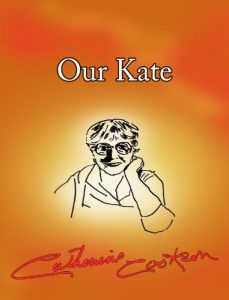Catherine Cookson’s personal story, Our Kate, made plain how it was she knew her background and her characters so well: she lived in it and with them, under conditions so hard and primitive that, as one reviewer of Our Kate wrote: ‘It is a vivid, raw, tenacious existence which she recollects; at times almost more than the eye can endure.’
Being born illegitimate was only one of the difficulties she lived through, but the stigma was to dominate her consciousness until well into her middle years, when, in the calm of a happy marriage, she was able to accept all the varied influences that had formulated her character, and to write it all down in this masterful exercise in self-therapy and reconciliation.
Our Kate of the title is not Catherine Cookson, but her mother, and it is around her that the autobiography revolves. Her mother is presented with all her faults yet, despite these, she comes out as a warm and loveable human figure. And against this background we see cast in relief the young Catherine going to ‘the pawn’, fetching the beer, being ignored because of her birth, collecting driftwood from the river and coke as it fell off the gas-carts, for she lived and struggled through the era when work was scarce and social security non-existent.
This is an autobiography that is also the story of a period. It is a bleakly honest statement about living with hardship and poverty seen through the eyes of a highly sensitive child and woman. No one can read Our Kate without realising that good can come out of bad and hope can conquer despair, and ultimately it is a very happy book.
Being born illegitimate was only one of the difficulties she lived through, but the stigma was to dominate her consciousness until well into her middle years, when, in the calm of a happy marriage, she was able to accept all the varied influences that had formulated her character, and to write it all down in this masterful exercise in self-therapy and reconciliation.
Our Kate of the title is not Catherine Cookson, but her mother, and it is around her that the autobiography revolves. Her mother is presented with all her faults yet, despite these, she comes out as a warm and loveable human figure. And against this background we see cast in relief the young Catherine going to ‘the pawn’, fetching the beer, being ignored because of her birth, collecting driftwood from the river and coke as it fell off the gas-carts, for she lived and struggled through the era when work was scarce and social security non-existent.
This is an autobiography that is also the story of a period. It is a bleakly honest statement about living with hardship and poverty seen through the eyes of a highly sensitive child and woman. No one can read Our Kate without realising that good can come out of bad and hope can conquer despair, and ultimately it is a very happy book.






